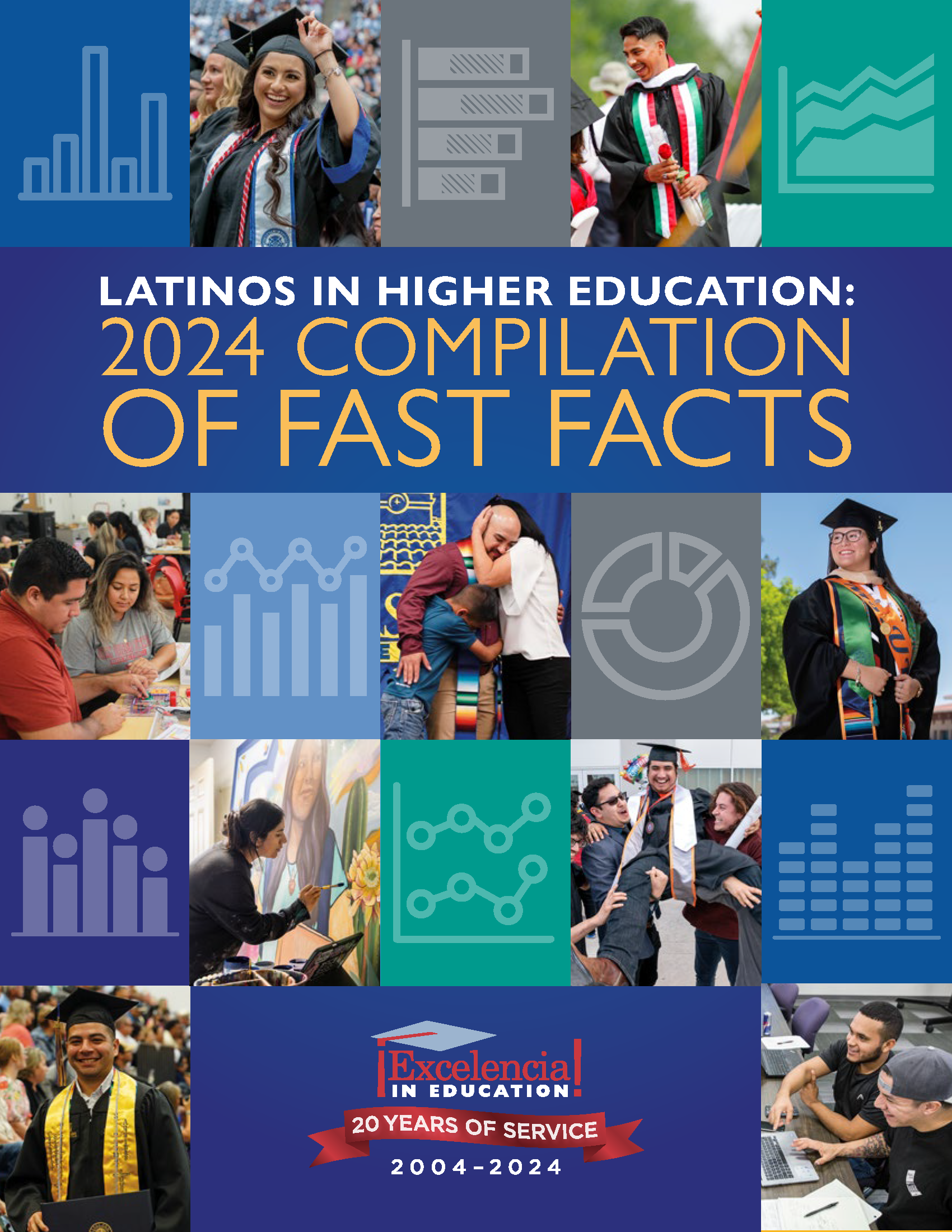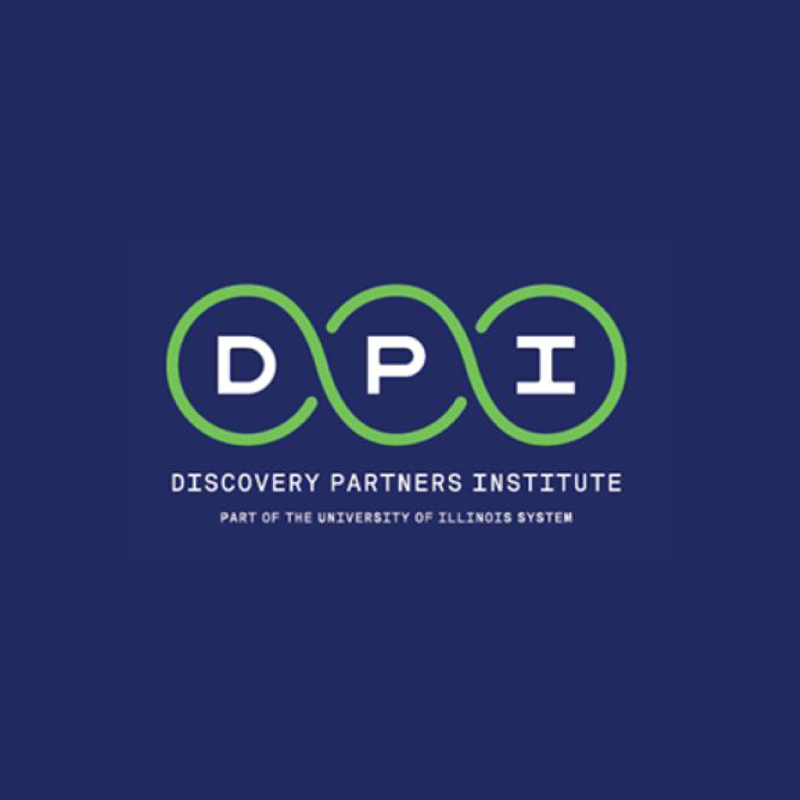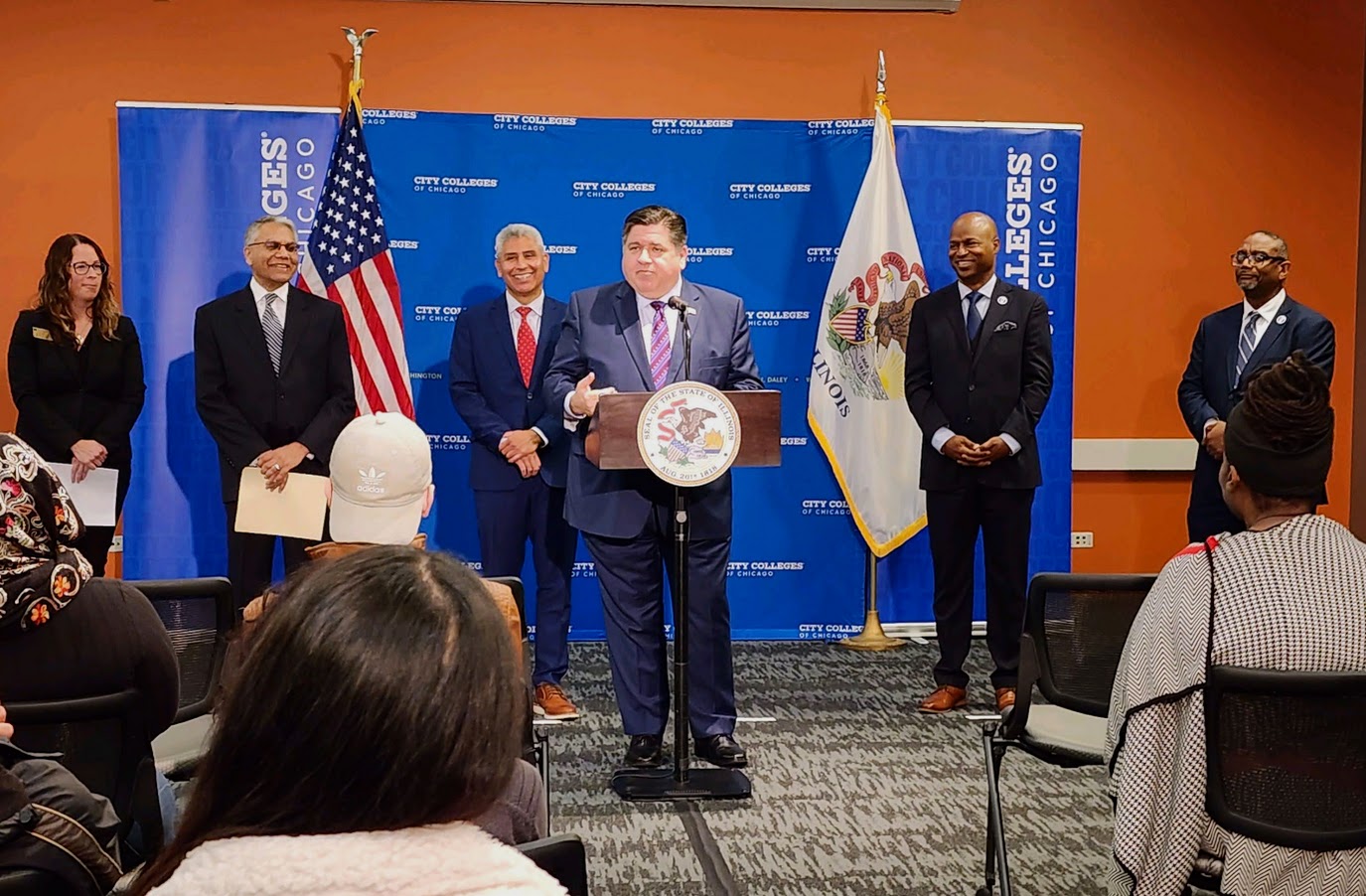WASHINGTON, D.C. (April 9, 2024) – Excelencia in Education announces today therelease of a comprehensive new profile of Latino students — one of the fastest growingpopulations in higher education — and institutions where they enroll in order to informpolicy and mobilize action that ensures they are served well. It shows Latinos representthe majority of growth in the number of degrees earned nationwide, despite their lowerdegree attainment compared to all students. The analysis, “Latinos in Higher Education: 2024 Compilation of Fast Facts,”demonstrates Latinos account for 79% of the 4% overall increase in the number ofdegrees earned over the last five years. Latinos have made significant gains in degreecompletion, but only 27% of Latinos had earned an associate degree or higher in2021-22, compared to 44% of all people. Latinos continue to be underrepresentedacross degree levels. “For 20 years, Excelencia has led the way with analysis and actionable efforts toaccelerate Latino student success in higher education,” said Deborah Santiago,co-founder and CEO of Excelencia. “Our new compilation of fact sheets builds on theseefforts, sets the stage for national policy discussions, and equips institutions to moreintentionally serve the growing number of Latino students on their campuses whileincreasing success for all.” In addition to providing a comprehensive profile of Latino students, institutions thatserve them, and the opportunities they face, the analysis informs Excelencia’s fourpolicy priorities: affordability, institutional capacity, retention, and transfer.Key findings from the analysis include:
Latinos are far more likely to be first-generation college students. Half ofLatinos (51%) were first-generation college students, compared to AfricanAmericans (38%), Asians (30%), and Whites (22%). Latinos are more likely to receive the federal Pell Grant. In 2019-20, abouthalf of Latino students (49%) received a Pell Grant, awarded to studentsdisplaying exceptional financial need. Only 26% of Latinos accepted federal student loans, fewer than any group except Asians (25%). Latinos have the highest labor force participation rate. Two-thirds of Latinos (66%) participated in the labor force in 2022. However, Latinos are overrepresented in lower paying occupations, with 34% in manual labor roles. Institutions serving Latinos are predominantly Hispanic-Serving Institutions (HSIs). 600 HSIs represent 20% of all colleges and universities yet educate 63% of Latino students. Seal of Excelencia certified institutions graduate Latinos at a higher rate than institutions nationally. Institutions with the Seal — a national certification for intentionally serving Latino students — represented less than 1% of colleges and universities yet enrolled 15% and graduated 17% of Latino students.
Excelencia in Education works with a national network of institutions committed toknowing and intentionally serving Latino, and all, students so they thrive on theircampuses. “Increasing the number of Latinos that earn degrees is essential to meeting ourcountry’s workforce and civic leadership needs,” said Sarita Brown, co-founder andpresident of Excelencia. “We are proud to make common cause with institutionalleaders who choose to be part of our national network committed to accelerating Latinostudent success in higher education. Together, they are ensuring America’s bright futurewith the talents of Latinos.” “Latinos in Higher Education: 2024 Compilation of Fast Facts” benefited from thesupport and public leadership of 24 colleges and universities that have earned the Sealof Excelencia:
City Colleges of Chicago, Richard J. Daley College City Colleges of Chicago, Wilbur Wright College Arizona State University Austin Community College District California State University Channel Islands California State University, Fresno California State University, Fullerton California State University, Long Beach California State University, Northridge El Paso Community College Florida International University Grand Valley State University Long Beach City College Mercy University Miami Dade College San Antonio College South Texas College Edward’s University University at Albany, SUNY University of Illinois Chicago The University of Texas at Arlington The University of Texas at Austin The University of Texas Rio Grande Valley The University of Texas at San Antonio
Access the full analysis: EdExcelencia.org/latinos-higher-ed-2024-fast-facts ### About Excelencia in EducationIn 2024, Excelencia in Education marks 20 years of service to accelerate Latino studentsuccess in higher education by promoting Latino student achievement, conductinganalysis to inform educational policies, advancing institutional practices, andcollaborating with those committed and ready to meet the mission. Launched in 2004 inthe nation’s capital, Excelencia has established a network of results-oriented educatorsand policymakers to address the U.S. economy’s needs for a highly educated workforceand engaged civic leaders. For more information, visit: EdExcelencia.org
Wright College Continuing Education students are building real-world cyber skills—and having fun while doing it. The 27 students enrolled in Wright’s National Cyber League – Capture the Flag (NCL-CTF) course this fall recently faced off in a three-day cybersecurity skills competition known as the NCL—or National Cyber League—Competition. The students scored well in both individual and team-based events, allowing Wright to place #45 in the “Power Rankings” among over 8,580 students from 510 colleges and universities. Participating in the competition is a requirement of the NCL-CTF course, which offers students the opportunity to build their cyber skill set, work individually and as a team, and learn from subject matter experts in the industry. After successful completion of the competition, participants earn a “Scouting Report” that recognizes their knowledge and abilities, and shows future employers’ what they are capable of. For the fall season games, the 27 students broke into four teams. The top-scoring team in the class, which was made up of seven students, received 32nd place out of 454 teams on the “Experienced Student Track.” Rachelle Ankney Rachelle Ankey was part of the high-scoring team. This fall is her second time completing the NCL-CTF course at Wright, and she attributes her current job as an information security analyst to both the class and competition. Previously a math teacher, Rachelle was encouraged to enroll in the course through a friend of a friend who knew she was looking for something new. “Not only did the games give me more confidence when I was interviewing, but now that I’m working in the field, I’m able to use things I learned in the competition regularly,” Rachelle said. Because the competition involves a new set of games each season, Rachelle decided to enroll in the course for a second time to further bolster her skill set. Based on her prior knowledge and her previous career as a teacher, she was able to help her instructor facilitate the class this time around. “To me, serving as a class facilitator is a way to give back and pass along the gift that I feel the course gave me,” she said. Instructor Chris Lemmon says her students come from a wide range of backgrounds and ability levels. They include career changers, those who have completed training but need to build hands-on experience, those who are new to the cyber industry, and alumni like Rachelle who are working in the industry and return to take the class multiple times. With Lemmon and fellow instructor Ashley Templet as their coaches, Rachelle’s team got together in person for the three-day competition, which started at 8:00 a.m. on a Friday morning and lasted until 8:00 p.m. on Sunday evening. They were keeping an eye on their score throughout the weekend and were motivated by their high ranking and their ability to work together as a team. “The game is essentially a complex and challenging test, and it’s so rewarding when you get something correct,” said Rachelle. “Knowing we were placing well nationally definitely gave us an adrenaline boost.” Victor Cai, another student on Rachelle’s team, was Wright’s highest-scoring student in the individual games. He placed 75th out of nearly 8,000 participants in the “Standard Student Bracket,” earning a score in the top 1% of individual competitors. The spring session of the NCL-CTF course begins on January 30, 2024. To learn more and apply, visit https://bootcamp.ccc.edu/ncl-ctf/.
The CS Starter Academy to serve more than 200 City College students through programs that address barriers and support student journeys into computer science and technology CHICAGO — The Discovery Partners Institute, part of the University of Illinois System, today launched the CS Starter Academy, a new, comprehensive year-round program to support City Colleges of Chicago students with an interest in computer science (CS) and technology while addressing the barriers they face when transferring to four-year universities and entering computer science and tech-related fields. The program represents a partnership with the City Colleges of Chicago, the University of Illinois Urbana-Champaign and the University of Illinois Chicago, and has been made possible through generous support from Google, as part of Grow with Google, the company’s economic opportunity initiative. Computing is the top source of new wages in the United States, and computer science accounts for the majority of new STEM jobs, according to Code.org. However, Black and Latinx populations currently make up just 12-14% of Chicago’s tech workforce overall, an inequity driven largely by inadequate and uneven access to high-quality computer science education opportunities. Community Colleges play an essential role in providing equitable access into higher education, however, fewer than 31% of these students matriculate to a four-year institution within six years due to barriers such as credit transfer issues, financial constraints, complexity of transfer processes, lack of self-efficacy, and inadequate support. The CS Starter Academy offers a holistic approach to address these issues. Its goals include increasing awareness of the diverse tech sectors in Chicago, fostering belonging and interest in four-year colleges, encouraging students to envision themselves in CS careers, and clarifying the CS pathway from community college to a four-year institution. Students will also have the opportunity to earn an industry-recognized Google Career Certificate, which prepares people for entry-level jobs in growing fields including cybersecurity, data analytics, and User Experience (UX) design. The program includes an employer consortium of over 150 companies — including Google — that considers graduates for relevant open roles. “The disparities in CS education have been driven by a lack of access, inclusion, and clarity about the pathways into these fields,” said Stephanie DeCicco, associate director of community college programming at DPI. “This new program will create greater access for historically underrepresented groups in tech to pursue computing fields and build smoother pathways to four-year universities and into a successful career in tech.” “In order to build for everyone, we need everyone,” said Jessica Holberg, Google’s tech education outreach lead in Chicago. “CS Starter Academy is a needed program to work toward a Chicago tech workforce that is representative of Chicago. Google is proud to partner with DPI and City Colleges of Chicago to ensure that students access and thrive in a high-quality computing education.” “The CS Starter Academy will go a long way in supporting students who are interested in computer science and technology here at City Colleges,” said Chancellor Juan Salgado, City Colleges of Chicago. “Community colleges are uniquely positioned to connect more Black and Latinx students to opportunities, and to creating equity in STEM fields. We are grateful to partner with DPI to do this important work together.” The program offers individual academic advising, near-peer mentoring, support services, and resource materials to simplify the complexities of CS transfer, including credit transfer and financial aid. The program targets community college students on a four-year pathway, incoming and rising sophomores at City Colleges of Chicago, and past and current students participating in other DPI education programs such as Digital Bridge and Digital Scholars. The program will serve 40 students in a cohort-based set of monthly activities and workshops that also are open to other City College students, bringing total anticipated reach to more than 200 students. Programming will run from fall 2023 through summer 2024, with more than 80% of students intending to transfer to four-year institutions. Students who actively participate in the CS Starter Academy cohort can earn stipends that offset missed employment opportunities due to their commitment to the program. The CS Starter Academy will directly benefit Chicago and greater Chicago-area community college students, with a focus on Black, Latinx, female, first-generation, and underrepresented groups in tech. The success of the CS Starter Academy hinges on partnerships with DPI, City Colleges of Chicago, and other support organizations in Chicago to ensure that the academy identifies and serves its target student population effectively. This program builds on DPI’s suite of programs for K-12 and community college students as part of its Pritzker Tech Talent Labs Community Education Unit. This includes the Digital Explorers program for middle school students; Discover Computing, run in partnership with Wright College and Google, for ninth and tenth graders; and the summer Digital Scholars program, in partnership with the University of Illinois Chicago’s CHANCE program, University of Illinois Urbana-Champaign’s College of Liberal Arts & Sciences and the Grainger College of Engineering, for high school students to take college-level courses in computer science, data science, electrical and computer engineering, and mobile app development. For more information about the program, or to get involved, contact Stephanie DeCicco, associate director, Community College Partnership at DPI at decicco@uillinois.edu. About DPI Discovery Partners Institute, part of the University of Illinois System, empowers people to jumpstart their tech careers or companies in Chicago. DPI does three things: Train people for high-demand tech jobs; conduct applied R&D; and support business building. With state investment, an innovation district in development, and a high-powered network of university partners regionally and internationally, DPI has the resources to attract, develop, retain, and leverage the most ambitious talent in Chicago to address global challenges in our environment, agriculture, industry, life sciences, and shared digital future. Learn more at https://dpi.uillinois.edu/
City Colleges of Chicago and Lincoln Land Community College will host training sites while participants earn $54k salaries CHICAGO— Joined by educators, lawmakers and advocates, Governor JB Pritzker announced today that the Illinois Department of Innovation & Technology (DoIT) is launching a paid trainee program to build a pipeline of tech talent to meet the growing demand for skilled professionals and diversify the agency’s workforce. “As Governor, I’m determined to make sure every Illinoisan can access good jobs — the kind that pays the bills and also supports the dreams of their families,” said Governor JB Pritzker. “We are launching an IT trainee program to build a pipeline of tech talent to meet the growing demand for skilled tech professionals and diversify our state’s tech workforce. From creation to consumption, Illinois is paving the way in the digital economy for all our residents.” To watch the press conference on Facebook, click here. Trainees will receive a minimum yearly salary of $54,000 from DoIT while pursuing tracks in one of five high-need concentration areas: cybersecurity, networking, coding and database, end user computing and enterprise infrastructure. Additional tracks will be added as the program grows. Trainees will also receive formal mentoring from current DoIT employees and be offered a full-time job with DoIT after completing the program and meeting its benchmarks. Cohorts will begin with initial classes of 20 participants, with additional cohorts launching as needed. Lincoln Land Community College developed the curriculum for participants and will host a training site in Springfield. DoIT is also pleased to partner with City Colleges of Chicago to provide a Chicago-based training site and expand the program’s reach. Applicants should apply online at DoIT.illinois.gov. There will be two recruitment events:
Friday, November 3 from 10 a.m. to 2 p.m. at City College’s Harold Washington campus in Chicago OR Tuesday, November 7 from 10 a.m. to 2 p.m. in the Kreher Building at Lincoln Land Community College in Springfield.
Prospective applicants can email DoIT.Recruitment@illinois.gov with application questions. We are thrilled to collaborate with Governor Pritzker, City Colleges of Chicago and Lincoln Land Community College on this initiative,” said Illinois Department of Innovation & Technology Acting Secretary and State CIO Sanjay Gupta. “By investing in the development of a strong talent pipeline, we are not only shaping the future of our workforce, but also driving innovation and growth in our community. This partnership is a testament to our unwavering commitment to diversity and nurturing local tech talent, propelling our state to new heights of success.” “Lincoln Land Community College is a leader in training individuals for vital careers in the technology and cybersecurity fields,” said Dr. Charlotte Warren, President of LLCC. “We’re proud to serve students with this innovative partnership that will help DoIT grow their own workforce, and we applaud DoIT and the Governor’s administration for recognizing the workforce training programs provided by community colleges.” “Our thanks go to Governor Pritzker and the Illinois Department of Innovation and Technology for leading the creation of a new pipeline between community colleges and public sector technology careers,” said Chancellor Juan Salgado. “This collaboration will complement City Colleges’ growing suite of technology programs that offer our students relevant skills, hands-on experience, and a pathway into Illinois’ dynamic tech industry.” DoIT will soon be accepting applications for the inaugural class of the trainee program. The program was designed to make the broadest possible group of individuals eligible to participate. For additional information on the trainee program, applicant criteria, and upcoming hiring events, email DoIT.Recruitment@illinois.gov.



